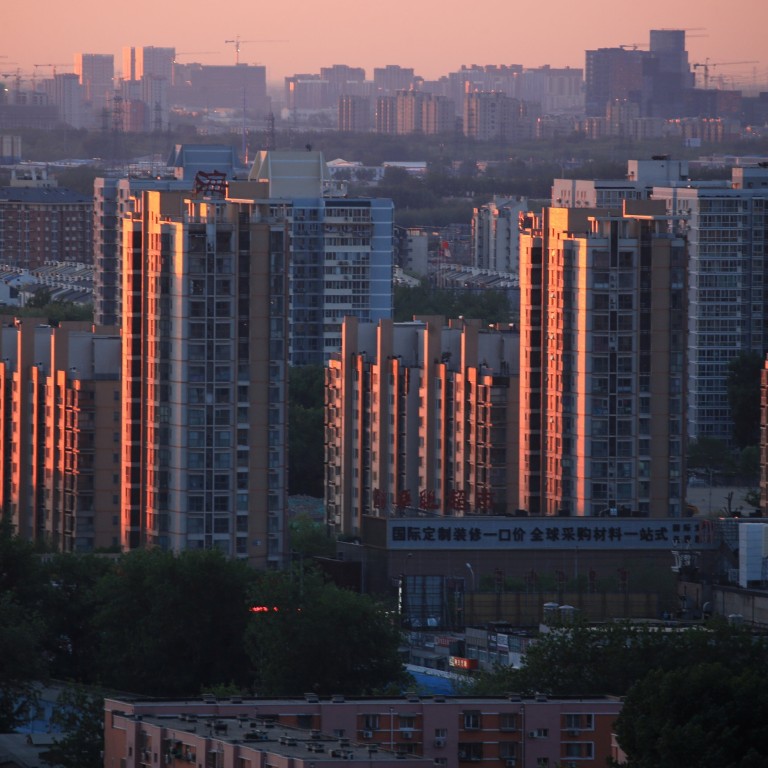
Will China’s proposed property tax be big enough to support struggling local governments?
- Analysts weigh in on the impact of a newly proposed property tax and how it will compare to revenue pulled in from land sales
- Cities with high exposure to the property market, such as those in the northeastern rust-belt region, could take a hit
To effectively stabilise local fiscal conditions, Zhang Yu, an assistant professor with Peking University’s Guanghua School of Management, estimated that the tax rate needs to be either 0.5 per cent nationwide, or 2.5 per cent with an exemption for those who own one home.
“Both plans would impose a high tax burden on Chinese households. To a great extent, the tax can only be a complementary tool,” he said. “The process of shifting from land reliance to property tax is destined to be difficult.”
But without a big new property tax, any revenue raised by local governments would inevitably pale in comparison with land sales, which have long sustained local governments.
For instance, Shanghai raised 19.9 billion yuan (US$3.11 billion) in revenue last year through an existing property tax of 0.4 to 0.6 per cent, but that total was much lower than the 314.3 billion yuan raised from land sales. And Chongqing reaped 7.2 billion yuan from property taxes – significantly lower than the 150 billion yuan it pulled in from land revenue.
On October 23, Chinese authorities announced property-tax-reform plans and named a number of pilot cities to pioneer the imposition of new taxes on owners of property and land – a signal that some say means the golden era of property ownership is coming to an end.
Research by GoguData, a Shenzhen-based advisory firm, also paints a worrying picture for cities with high exposure to the property market.
More than 20 large and medium-sized cities were found to be highly dependent on land-sale revenue. The list was led by Foshan, a southern city well known for its ceramics industry, as land-sale income was 1.8 times that of its total budgetary fiscal revenue, which excludes land sales and central government transfers.
Local authorities often pull in half of the revenue stream from demolitions, maintenance and other costs.
Policymakers are looking into property tax as an alternative source of fiscal revenue
Foshan was followed by the eastern city of Nanjing, whose land-sale income was 1.53 times that of its budgetary fiscal revenue. The rate in Guangzhou was 1.5, and Hangzhou’s was 1.22. Hangzhou is the capital of China’s first common-prosperity pilot province of Zhejiang.
However, the impact is much bigger for cities such as Changchun, located in the northeastern rust-belt region. Its land income was 1.55 times that of its budgetary fiscal revenue last year.
As Beijing reined in LGFVs to prevent debt from ballooning, infrastructure investment went from a double-digit growth before 2018 to only 1.5 per cent in the first nine months of this year.
“The levy of property tax will be gradual. Its size may be obviously smaller than land sales revenue in the initial stage, and it will have a limited role in improving local fiscal position,” according to a report by S&P Global China Ratings last week.
The growing government curbs and Evergrande’s debt crisis cooled the property market quickly, with nearly two-thirds of land plots in 100 Chinese cities being passed at auctions in September – the highest level since 2008.
In his article on the 2021-25 development blueprint, finance minister Liu Kun pledged to improve the local tax system, gradually raise the proportion of income and property-related taxes, and let the central government shoulder more expenditure responsibility.
Regardless of whether it works, a likely scenario is that cities with bigger revenue struggles will likely be considered pilots for the new tax, said Lu Zhe, chief economist with Shanghai-based Topsperity Securities.
“Some struggling cities could be considered because their fiscal conditions are already deteriorating. Introducing the property tax will partly solve their problems,” Lu said.
China re-centralised tax revenue in 1994, leaving city and county governments to rely on land sales and financing vehicles as sources of revenue. The national land sales income rose 15.9 per cent year on year to 8.4 trillion yuan (US$1.3 trillion), making up 44 per cent of self-raised fiscal revenue among all local governments , according to government data.

